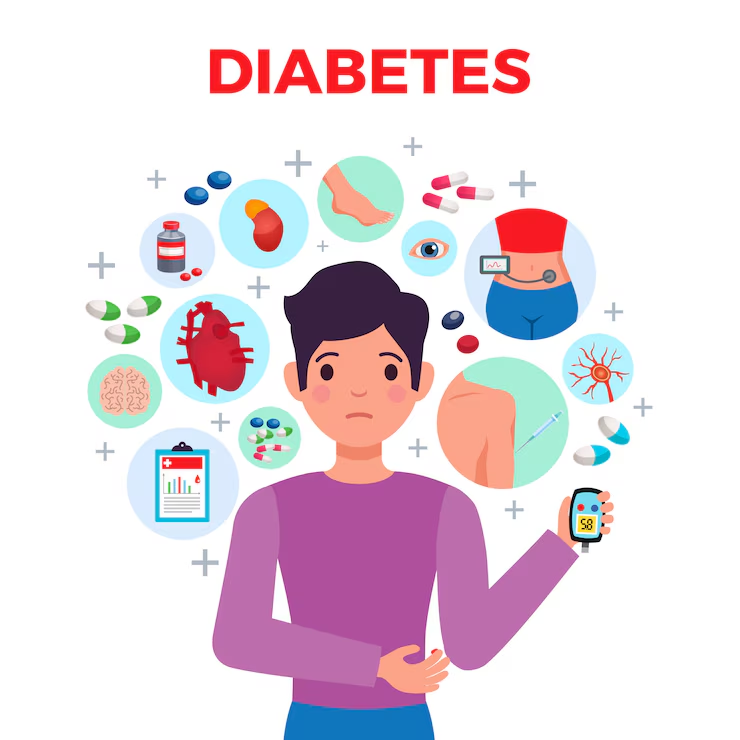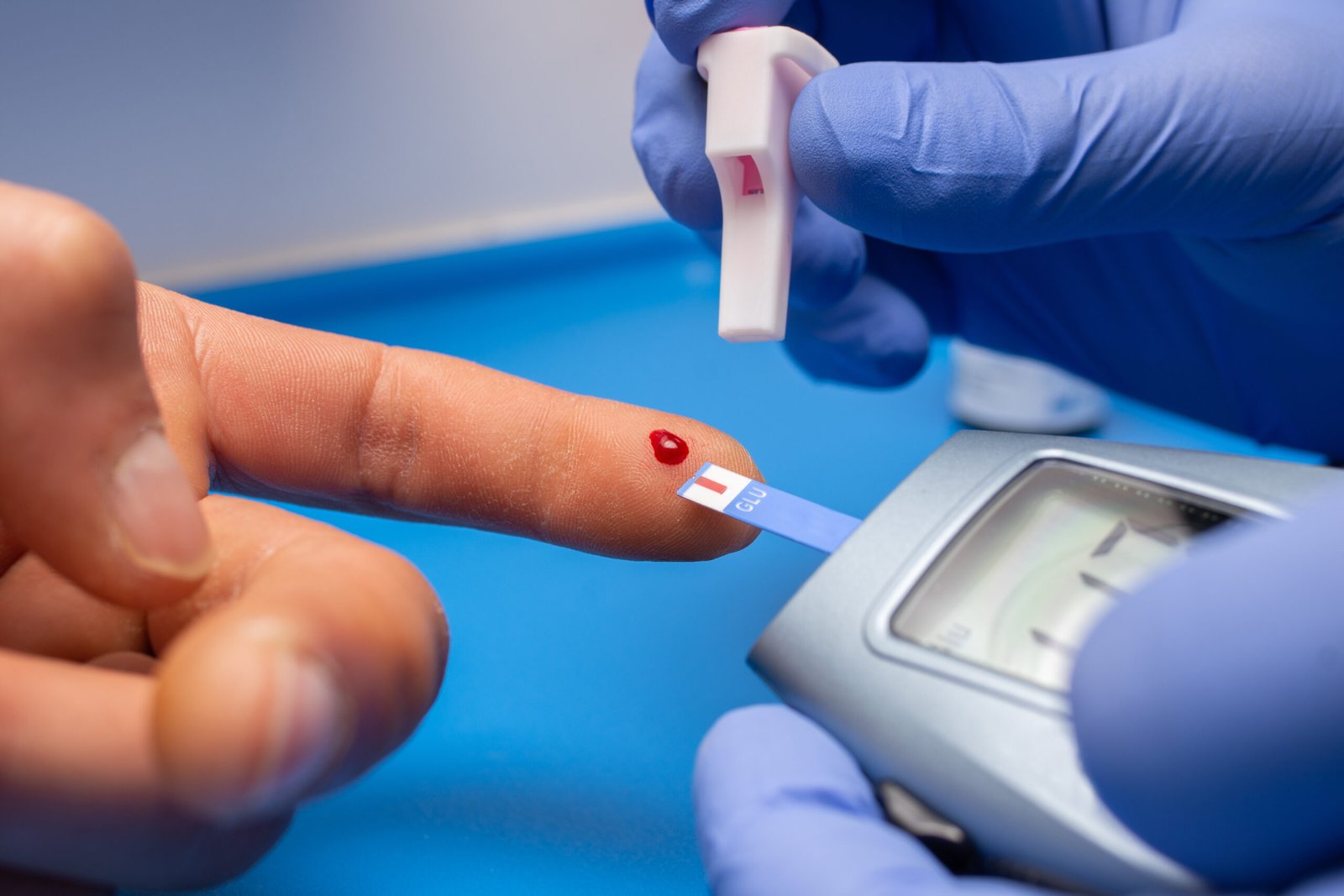- By Dr. Ravi Shah, Endocrinologist
Diabetes is more than just high blood sugar – it is a complex, lifelong condition that affects millions of people worldwide. Among its different forms, Type 1 Diabetes (T1D) stands out as an autoimmune condition typically diagnosed in childhood or early adulthood. In this condition, the body’s immune system mistakenly attacks the insulin-producing beta cells in the pancreas, leading to absolute insulin deficiency. If you or a loved one is managing T1D or wants to understand this condition better, this guide will provide essential insights. For expert care, consult Dr. Ravi Shah, one of the best endocrinologists in Ahmedabad, for personalized guidance and management.

What is Type 1 Diabetes?
Type 1 Diabetes is a long-lasting condition where the body’s immune system attacks the cells in the pancreas that make insulin. Insulin is a hormone that helps move sugar from the food we eat into our body’s cells to give us energy. When the body can’t make insulin, sugar stays in the blood instead of going into the cells, making blood sugar levels very high. This can cause health problems if not controlled.
People with Type 1 Diabetes need to take insulin every day, either with injections or a pump. They also need to eat healthy, exercise regularly, and visit the doctor often. Learning how to check blood sugar and understanding how food and activity affect the body helps keep health problems away and makes living with Type 1 Diabetes easier.
Type 1 Diabetes happens when the body’s immune system mistakenly attacks the cells in the pancreas that make insulin. Insulin is a hormone that helps move sugar from the blood into the body’s cells to give us energy. When these cells are destroyed, the body can’t produce insulin, and blood sugar levels rise.
Why does this happen?
Scientists aren’t exactly sure why this immune attack occurs, but they believe it’s due to a mix of genes and environmental factors:
-
Environmental Factors:
● Viral infections (like enteroviruses, rubella, or mumps)
● Drinking cow’s milk or certain baby formulas at a young age might sometimes trigger the immune system to attack the body’s own cells.
● Being around certain harmful chemicals in food, water, or the environment might increase the chance of the immune system attacking the body’s cells.
● Low vitamin D levels in early childhood.
-
Genetics:
● If family members have Type 1 Diabetes, your chances are higher.
● If your mother has it, the risk is about 1-4%.
● If your father has it, risk is about 3-8%.
● If both parents have it, risk can be as high as 30%. ● Genes make you more likely, but don’t directly cause the disease.
-
Autoimmune Reaction:
● Type 1 Diabetes happens when the body’s defense system mistakenly attacks the cells in the pancreas that make insulin.
● This attack can happen slowly over time, and it may take months or years before you notice any signs or symptoms.
-
What Type 1 Diabetes Is Not Caused By:
● Type 1 Diabetes is not caused by eating too much sugar.
● It’s not caused by being overweight or lifestyle choices.
● Even healthy and active kids and adults can develop it.
● It’s an autoimmune condition, and it’s not anyone’s fault.
Common Symptoms of Type 1 Diabetes
Symptoms can come on quickly and get worse fast. If not treated, it can cause serious problems.
-
● Feeling very thirsty and needing to pee often
-
● Feeling very hungry even after eating
-
● Losing weight without trying
-
● Feeling tired and weak
-
● Blurry vision
-
● Mood swings or irritability
-
● Fruity-smelling breath
-
● Wounds that heal slowly
-
● Getting sick or infections often
-
● In children, signs like bedwetting, tiredness, and sudden behavior changes are important to notice.

Treatment Options for Type 1 Diabetes
There is no cure for Type 1 Diabetes yet, but it can be managed well with the right care and habits. Here’s how:
Insulin Therapy
People with T1D need to take insulin every day. This can be through:
- Injections
- Insulin pens
- Insulin pumps
- Automated systems that deliver insulin automatically
Blood Sugar Monitoring

Keeping blood sugar in the right range is important. You can do this by:
Normal levels:
- Before meals: 80-130 mg/dL
- 1-2 hours after eating: less than 180 mg/dL
Why it’s important:
- Prevents feeling tired, thirsty, or dizzy
- Reduces risk of health problems like kidney, eye, and nerve damage
How to keep it in range:
- Regularly check blood sugar
- Eat healthy and follow your doctor’s advice
- Stay active and take medicines as prescribed
- Finger-prick tests
- Using Continuous Glucose Monitors (CGMs) that track sugar levels all the time and alert you if they go too high or too low.
Counting Carbs in Food
- Eating low-glycemic foods (which don’t spike sugar quickly)
- Having regular meal times
- Limiting sugar and processed foods
- A dietitian can help plan the best diet for you.
Physical Activity
Exercise helps improve insulin sensitivity and control blood glucose.
People with Type 1 Diabetes should:
- Exercise regularly
- Monitor blood sugar before and after
- Adjust insulin and snacks as needed
Complications of Poorly Controlled Type 1 Diabetes:
- Diabetic Retinopathy: High blood sugar can damage the tiny blood vessels in the retina, leading to vision loss if untreated.
- Diabetic Neuropathy: Nerve damage causing symptoms like numbness, tingling, or burning pain, particularly in the feet and hands.
- Kidney Disease (Nephropathy): Long-term high blood sugar can damage the kidneys, leading to kidney failure if not properly managed.
- Cardiovascular Disease: Increased risk of heart attack, stroke, and other heart-related issues.
- Diabetic Ketoacidosis (DKA): A life-threatening condition resulting from severe insulin deficiency, leading to dangerously high blood sugar and acidic blood.
Emotional Support
Living with T1D can affect mental health. Support from family, friends, counselors, and diabetes educators is important.
- Join support groups
- Practice stress relief techniques
- Talk to a psychologist if needed
- Risks of Poor Control
- If T1D is not managed properly, it can cause serious health problems like kidney damage, heart issues, nerve damage, vision loss, foot infections, and stroke.
- Good management reduces these risks.

Type 1 Diabetes in Children and Teens
- T1D is often diagnosed in children. Parents should:
- Educate themselves and the child about diabetes
- Work closely with schools for care plans
- Encourage independence in managing the condition as the child grows
Conclusion
Living well with T1D requires ongoing effort, but it is entirely possible with the right support and medical care. Stay proactive, stay informed, and consult Dr. Ravi Shah, one of the best endocrinologists in Ahmedabad, for personalized guidance and cutting-edge treatment options.
